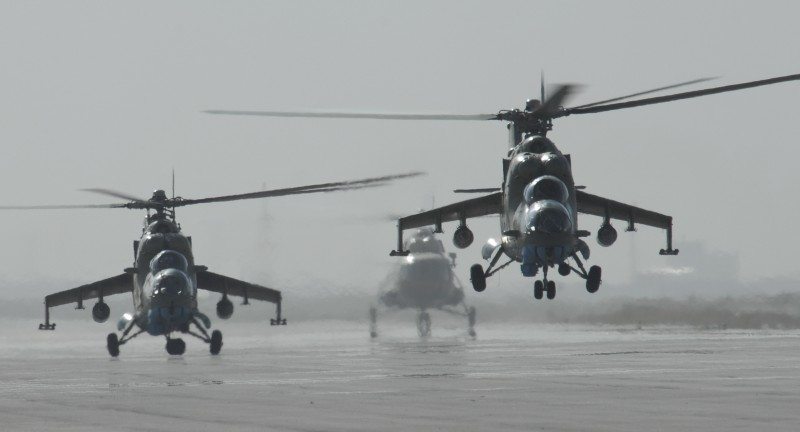US Secretary of State Hillary Clinton accused Russia Tuesday of sending attack helicopters to Syria, warning it will escalate the fighting and openly questioning whether the UN mission can survive beyond the end of its mandate in July.
As a top UN peacekeeping official said Syria had now descended into civil war, Clinton said the future of the UN mission could be in doubt if no progress is made in implementing the peace plan drawn up by UN-Arab League envoy Kofi Annan.
“There’s no doubt that the onslaught continues, the use of heavy artillery and the like,” Clinton told a discussion with Israeli President Shimon Peres hosted by the Brookings Institution.
Washington had pressed Moscow, a longstanding ally of Damascus, to stop what Clinton called “continued arms shipments to Syria.”
“They have from time to time said that we shouldn’t worry, that everything they’re shipping is unrelated to their actions internally. That’s patently untrue,” the top US diplomat insisted.
“We are concerned about the latest information we have that there are attack helicopters on the way from Russia to Syria, which will escalate the conflict quite dramatically,” Clinton added.
Annan has been trying to implement on the ground his six-point peace plan, which calls for both sides to lay down their arms immediately and participate in Syrian-led political transition.
But there has been increasing violence as Syrian President Bashar al-Assad has refused to step aside and instead unleashed his heavily armed forces against the opposition movements.
Activists say some 14,100 people have now been killed in the uprising against the Assad family, which has ruled Syria for some four decades.
And UN peacekeeping chief Herve Ladsous said on Tuesday that the country had now descended into full scale civil war.
Asked whether he believed Syria is in a civil war, UN peacekeeping chief Herve Ladsous told AFP and one other reporter: “Yes I think we can say that.
“Clearly what is happening is that the government of Syria lost some large chunks of territory, several cities to the opposition, and wants to retake control,” he said, confirming that UN observers had heard reports of attack helicopters being used.
Given the prolonged violence, Clinton openly questioned whether the UN mission in Syria could survive once its 90-day mandate expires on July 20.
“We have a timeline in mind to see whether or not this effort of Kofi’s can be successful. The outer limit of that is July when the Security Council has to decide whether or not to extend the mission,” she said.
“If there is no discernible movement by then it would be very difficult to extend a mission that is increasingly dangerous for the observers on the ground,” Clinton said.
Experts are increasingly concerned that Syria is becoming the theater for a proxy war between the United States and its Arab allies, and Russia and Iran.
And Clinton said Syria now seemed to be awash with both arms and money. “There are lots of weapons on the black market. There’s money that’s available,” she said.
Annan was now trying to put together a contact group which would “include Russia” to work on a road map for a political transition, Clinton said, adding the United States was in agreement with that. But she stressed Washington drew the line at including Iran.
“We thought that would be a grave error since we know that Iran is not only supporting the Syrian regime but actively mentoring, leading, encouraging not only the regular army but the militias that are springing up,” she said.
State Department spokeswoman Victoria Nuland said Clinton was referring to fresh helicopters and not existing choppers in the fleet of Syria.
“She’s concerned about helicopters on the way. That’s a different matter than whether there are already Soviet-made helicopters or Russian-made helicopters that are being used by the regime,” Nuland told reporters.
The Pentagon meanwhile could not confirm any new Russian arms shipments had arrived in Syria, but acknowledged the regime employs Russian-made attack helicopters and other weaponry.
Asked if Russian deliveries of military equipment to Syria were enabling the Assad regime to carry out its offensive against the opposition, spokesman Captain John Kirby said: “To the degree that the Syrian armed forces use that resupply to kill their own people, then yes.”










